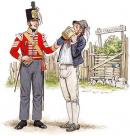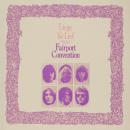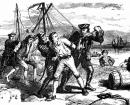What makes you go abroad fighting for strangers?
When you could be safe at home free from all dangers.
A recruiting sergeant came our way
To an inn nearby at the close of day,
He said, “Young Johnny you're a fine young man.
Would you like to march along behind a military band,
With a scarlet coat, a big cocked hat,
And a musket at your shoulder?”
A shilling he took and he kissed the book;
Oh poor Johnny what'll happen to you.
A recruiting sergeant marched away
From the inn nearby at the break of day.
Johnny went too with half a ring;
He was off to be a soldier, he'd be fighting for the King
In a far off war, in a far off land,
To face a foreign soldier.
But how will you fare when there's lead in the air;
Oh poor Johnny what'll happen to you?
What makes you go abroad fighting for strangers?
When you could be safe at home free from all dangers.
Oh the sun shone high on a barren land
As a thin red line took a military stand.
There was sling shot, chain shot, grape shot too,
Swords and bayonets thrusting through.
Poor Johnny fell but the day was won
And the King is grateful to you;
But your soldiering's done and we're sending you home;
Oh poor Johnny what have they done to you.
Oh they said he was a hero and not to grieve
Over two wooden pegs and empty sleeves.
They carried him home and they set him down
With a military pension and a medal from the crown.
You haven't an arm, you haven't a leg,
The enemy nearly slew you.
You'll have to go out on the streets to beg;
Oh poor Johnny what have they done to you.
What makes you go abroad fighting for strangers?
When you could be safe at home free from all dangers.
When you could be safe at home free from all dangers.
A recruiting sergeant came our way
To an inn nearby at the close of day,
He said, “Young Johnny you're a fine young man.
Would you like to march along behind a military band,
With a scarlet coat, a big cocked hat,
And a musket at your shoulder?”
A shilling he took and he kissed the book;
Oh poor Johnny what'll happen to you.
A recruiting sergeant marched away
From the inn nearby at the break of day.
Johnny went too with half a ring;
He was off to be a soldier, he'd be fighting for the King
In a far off war, in a far off land,
To face a foreign soldier.
But how will you fare when there's lead in the air;
Oh poor Johnny what'll happen to you?
What makes you go abroad fighting for strangers?
When you could be safe at home free from all dangers.
Oh the sun shone high on a barren land
As a thin red line took a military stand.
There was sling shot, chain shot, grape shot too,
Swords and bayonets thrusting through.
Poor Johnny fell but the day was won
And the King is grateful to you;
But your soldiering's done and we're sending you home;
Oh poor Johnny what have they done to you.
Oh they said he was a hero and not to grieve
Over two wooden pegs and empty sleeves.
They carried him home and they set him down
With a military pension and a medal from the crown.
You haven't an arm, you haven't a leg,
The enemy nearly slew you.
You'll have to go out on the streets to beg;
Oh poor Johnny what have they done to you.
What makes you go abroad fighting for strangers?
When you could be safe at home free from all dangers.
Lingua: Inglese
Una versione leggermente differente di questa storica canzone, così come riportata da questa pagina del "Mudcat Café/Digital Tradition
A slightly different version of this historic song as available at this Mudcat Café/Digital Tradition page
A slightly different version of this historic song as available at this Mudcat Café/Digital Tradition page
FIGHTING FOR STRANGERS
What makes you go away, fighting for strangers,
When you could be save at home, free from all dangers?
A recruiting sergeant came my way,
To an inn nearby at the break of day.
He said: "Young Johnny you're a fine young man,
Do you want to march along behind a military band,
With a scarlet coat, a big cocked hat
And a muscet on your shoulder?"
A shilling he took and he kissed the book,
Oh Johnny, what will happen to ya?
The recruiting sergeant marched away,
From the inn nearby at the break of day.
Johnny went too, with half a ring,
He was off to be a soldier, he'd be fighting for the king,
In a far off war, in a far off land,
To face a foreign soldier.
But how will he fare when there's lead in the air,
Oh poor Johnny, what will happen to ya?
The sun shone high on a barren land,
As a thin red line took the military stand.
Sling shot, chain shot, grape shot too,
Swords and bayonets thrusting through,
Poor Johnny fell but the day was won
And the King is grateful to ya.
With your soldier deeds done, we're sending you home,
Oh poor Johnny, what have they done to ya?
Oh, they said he was a hero and not to grieve
Over two wooden legs and an empty sleeve.
They carried him home and they sat him down
With a military pension and a medal from the crown.
You haven't an arm, you haven't a leg,
The enemy nearly slew ya.
You'll have to be put with a bowl to beg,
Oh poor Johnny what have they done to ya?
What makes you go away, fighting for strangers,
When you could be save at home, free from all dangers?
A recruiting sergeant came my way,
To an inn nearby at the break of day.
He said: "Young Johnny you're a fine young man,
Do you want to march along behind a military band,
With a scarlet coat, a big cocked hat
And a muscet on your shoulder?"
A shilling he took and he kissed the book,
Oh Johnny, what will happen to ya?
The recruiting sergeant marched away,
From the inn nearby at the break of day.
Johnny went too, with half a ring,
He was off to be a soldier, he'd be fighting for the king,
In a far off war, in a far off land,
To face a foreign soldier.
But how will he fare when there's lead in the air,
Oh poor Johnny, what will happen to ya?
The sun shone high on a barren land,
As a thin red line took the military stand.
Sling shot, chain shot, grape shot too,
Swords and bayonets thrusting through,
Poor Johnny fell but the day was won
And the King is grateful to ya.
With your soldier deeds done, we're sending you home,
Oh poor Johnny, what have they done to ya?
Oh, they said he was a hero and not to grieve
Over two wooden legs and an empty sleeve.
They carried him home and they sat him down
With a military pension and a medal from the crown.
You haven't an arm, you haven't a leg,
The enemy nearly slew ya.
You'll have to be put with a bowl to beg,
Oh poor Johnny what have they done to ya?
inviata da Riccardo Venturi - 20/11/2005 - 02:06
Lingua: Italiano
Versione italiana di Riccardo Venturi
20 novembre 2005
20 novembre 2005
COMBATTERE PER GLI STRANIERI
Ma perché te ne vai all’estero a combattere per gli stranieri
quando potresti startene al sicuro a casa, senza nessun pericolo ?
Un ufficiale di reclutamento ci venne incontro
a una locanda qua vicino, verso la fine del giorno.
Disse : « Johnny, ragazzo mio, sei proprio un bel giovanotto,
ti piacerebbe marciare al passo di una banda militare
con una bella giacca rossa, un bel cappello piumato
e un moschetto in spalla ? »
Poi prese uno scellino e baciò la Bibbia ;
Oh, povero Johnny, che ne sarà di te ?
Un ufficiale di reclutamento partì a passo di marcia
dalla locanda qua vicino sul far del giorno.
Johnny era con lui, con la sua metà dell’anello [*] ;
andava a farsi soldato, avrebbe combattuto per il Re
in una guerra lontana, in una terra lontana,
a fronteggiare un soldato straniero.
Ma come t’andrà quando il piombo volerà per l’aria ?
Oh, povero Johnny, che ne sarà di te ?
Ma perché te ne vai all’estero a combattere per gli stranieri
quando potresti startene al sicuro a casa, senza nessun pericolo ?
Il sole brillava alto su una terra secca e riarsa,
mentre una sottile linea rossa si disponeva in formazione militare.
Colpi fiondanti, colpi a catena e anche colpi a grappolo,
sciabole e baionette a trapassare ogni cosa.
Il povero Johnny cadde, ma la battaglia fu vinta
ed il Re te ne è grato ;
ma hai finito di fare il soldato e ti rimandiamo a casa ;
Oh, povero Johnny, che cosa ti hanno fatto ?
Dissero che era un eroe, e di non affliggersi
per due gambe di legno e per le maniche vuote.
Lo riportarono a casa e lo posarono giù
con una pensione militare e una medaglia della Corona.
Non hai più braccia, non hai più gambe
e il nemico quasi ti ha ammazzato.
Dovrai andare per le strade a mendicare ;
Oh, povero Johnny, che cosa ti hanno fatto ?
Ma perché te ne vai all’estero a combattere per gli stranieri
quando potresti startene al sicuro a casa, senza nessun pericolo ?
Ma perché te ne vai all’estero a combattere per gli stranieri
quando potresti startene al sicuro a casa, senza nessun pericolo ?
Un ufficiale di reclutamento ci venne incontro
a una locanda qua vicino, verso la fine del giorno.
Disse : « Johnny, ragazzo mio, sei proprio un bel giovanotto,
ti piacerebbe marciare al passo di una banda militare
con una bella giacca rossa, un bel cappello piumato
e un moschetto in spalla ? »
Poi prese uno scellino e baciò la Bibbia ;
Oh, povero Johnny, che ne sarà di te ?
Un ufficiale di reclutamento partì a passo di marcia
dalla locanda qua vicino sul far del giorno.
Johnny era con lui, con la sua metà dell’anello [*] ;
andava a farsi soldato, avrebbe combattuto per il Re
in una guerra lontana, in una terra lontana,
a fronteggiare un soldato straniero.
Ma come t’andrà quando il piombo volerà per l’aria ?
Oh, povero Johnny, che ne sarà di te ?
Ma perché te ne vai all’estero a combattere per gli stranieri
quando potresti startene al sicuro a casa, senza nessun pericolo ?
Il sole brillava alto su una terra secca e riarsa,
mentre una sottile linea rossa si disponeva in formazione militare.
Colpi fiondanti, colpi a catena e anche colpi a grappolo,
sciabole e baionette a trapassare ogni cosa.
Il povero Johnny cadde, ma la battaglia fu vinta
ed il Re te ne è grato ;
ma hai finito di fare il soldato e ti rimandiamo a casa ;
Oh, povero Johnny, che cosa ti hanno fatto ?
Dissero che era un eroe, e di non affliggersi
per due gambe di legno e per le maniche vuote.
Lo riportarono a casa e lo posarono giù
con una pensione militare e una medaglia della Corona.
Non hai più braccia, non hai più gambe
e il nemico quasi ti ha ammazzato.
Dovrai andare per le strade a mendicare ;
Oh, povero Johnny, che cosa ti hanno fatto ?
Ma perché te ne vai all’estero a combattere per gli stranieri
quando potresti startene al sicuro a casa, senza nessun pericolo ?
Nota:
[*] Un diffuso pegno d'amore dei tempi passati: si portava al dito (o con sé) metà dell'anello di fidanzamento, mentre l'altro o l'altra portava la restante metà. In pratica la cosa significa: si stava per sposare.
[*] Un diffuso pegno d'amore dei tempi passati: si portava al dito (o con sé) metà dell'anello di fidanzamento, mentre l'altro o l'altra portava la restante metà. In pratica la cosa significa: si stava per sposare.
×
![]()








Arr. Hart / Prior / Knight / Johnson / Kemp
To the tune of He Who Would Valiant Be by John Bunyan [1684]
Music: “St. Dunstan’s,” Charles Winstan Douglas, 1917
Alternate tunes:
“Moab,” John Roberts, 1870
“Monks Gate,” traditional Sussex melody; arranged by Ralph Vaughan Williams, 1904
Sul motivo di He Who Would Valiant Be di John Bunyan [1684]
Musica: “St. Dunstan’s,” Charles Winstan Douglas, 1917
Melodie alternative:
“Moab,” John Roberts, 1870
“Monks Gate,” traditional Sussex melody; arr. di Ralph Vaughan Williams, 1904
Gli Steeleye Span, storica formazione folk-rock britannica, hanno registrato questa canzone nell'ultimo (e uno dei migliori) album della loro formazione classica, "Rocket Cottage" [1976]. Una registrazione dal vivo dal tour del 1991 fu pubblicata sul CD "Tonight's the night". Un'altra registrazione del 6 dicembre 1994 alla St David's Hall di Cardiff è stata pubblicata nel video "25 Live: The Classic Twenty Fifth Anniversary Tour Concert."
La canzone è un montaggio militare di tre canzoni cucite insieme sopra strati di sovraincisione di percussione. I risultati furono sperimentali ed eccitanti.
Il ritornello proviene da "Our Captain Cried All Hands" che si può trovare ad esempio nell'album di Martin Carthy "Byker Hill".
Steeleye Span recorded this track for the last (and one of the finest) album of their “classic” line-up, Rocket Cottage. A live recording from the 1991 tour was released on the CD Tonight's the Night. Another live recording from St. David's Hall, Cardiff on December 6, 1994 was released on the video 25 Live: The Classic Twenty Fifth Anniversary Tour Concert.
This song is a tragic military montage of three songs segued together against layers of percussive over-dubbing. The results were both experimental and exciting. The chorus is from Our Captain Cried All Hands, which can be found e.g. on Martin Carthy's album Byker Hill.
from this page
The Mudcat Café